Deborah Wang
Contributing Reporter, Editor, & Host
About
Deborah is a contributing reporter, editor, and host at KUOW. Since joining the staff in 2005, Deborah has done everything from political reporting to podcast hosting and she has served as interim news director. She is an award–winning radio and television journalist whose career spans more than three decades.
Deborah's first reporting job was at public radio station WFCR in Amherst, Massachusetts. In 1990, she went to work for National Public Radio and served as NPR's Asia correspondent based in Hong Kong. During that time, she covered the Persian Gulf War from Saudi Arabia and Kuwait, and then spent months in southeastern Turkey and northern Iraq filing stories on the war's aftermath.
In 1993, she joined ABC News as a television correspondent in Beijing and Hong Kong, and covered, among other things, Hong Kong's handover from British to Chinese rule. In 1999, she set up the network's first news bureau in Seattle.
Deborah has also worked as an on–air anchor for CNN International, as host of IN Close on KCTS9 Public Television in Seattle. She is a long-time host on the TEDxSeattle stage.
In recent years, Deborah's reporting has focused on adolescents and mental health. She was the recipient of a 2018-2019 Rosalynn Carter Mental Health Journalism Fellowship.
Deborah has won numerous awards for her reporting, including the Alfred I. DuPont Silver Baton, the Overseas Press Club's Lowell Thomas Award and a Gracie Award from the Alliance for Women in Media Foundation.
To see more of Deborah's past KUOW work, visit our archive site.
Location: Seattle
Languages: English, conversational Chinese
Pronouns: she/her
Professional Affiliations: US Advisory Board Member, Rosalynn Carter Mental Health Journalism Fellowships
Stories
-
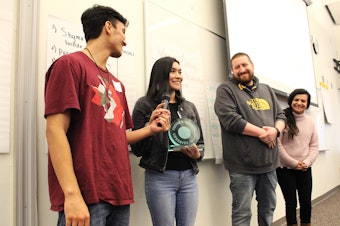
Education
As youth suicides increase, these teens want to save lives
How do you prevent kids from dying? Involve the whole school, says one University of Washington program.
-
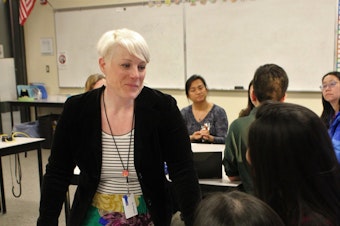
Education
The kids are not alright. High schools grapple with rising rates of mental illness
With rates of mental health disorders among adolescents are on the rise, some schools are working to provide more mental health education and more support for struggling students.
-
Environment
You have lots of questions about recycling. We have answers
We've gotten dozens of SoundQ's questions about one topic - recycling. So we're re-running this archive episode with loads of answers, on everything from how to recycle to the global waste market.
-
How humans and cougars live together
This week, SoundQ's shares KUOW's newest podcast, The Wild. Host Chris Morgan tracks down a cougar den and tries to work out how we continue to coexist with cougars.
-
The mysterious disappearance of the Ballard Locks sea lions
Years ago, sea lions treated the Ballard Locks like an all-you-can-eat salmon buffet. But most of those sea lions are gone now. What happened to those sea lions? The SoundQ's team investigates.
-
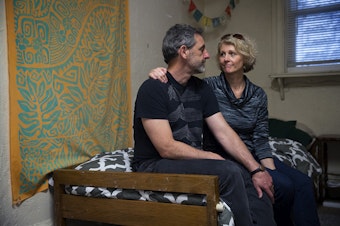
Health
'We get it wrong when we say the point is to be happy.' A mother reflects after her son dies
Calvin Clark was diagnosed with a severe form of bipolar disorder when he was a freshman in college. No one would treat him—their practices were full, or they didn’t serve that age range or diagnosis, or they didn’t call back.
-

Arts & Life
Why does Seattle have so much public art?
A KUOW listener asked why there's so much public art in Seattle. Reporter Marcie Sillman travels back in time nearly 50 years to tell the sometimes-fraught story.
-
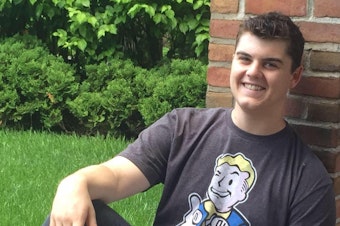
Health
This young Seattle man, whose life inspired a movement, has died. He was 23
Calvin Clark was an honors student and debate champion before he became seriously mentally ill. His story fueled efforts to reform the state's mental health system. This week, Clark died by suicide.
-
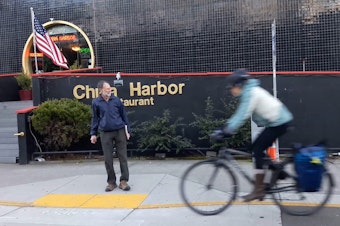
Arts & Life
There's no drivers' test for bicycling. So does anybody really know how to ride?
Does Seattle give bicyclists a free ride on following the rules of the road? SoundQs takes a look at what happens when the paths of pedestrians and cyclists cross.
-
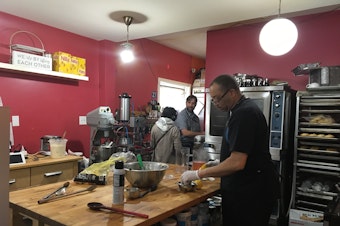
Health
What do those food safety emojis mean?
Is it safe to eat at restaurants that don't have a perfect rating?